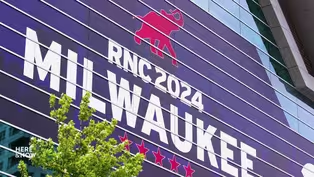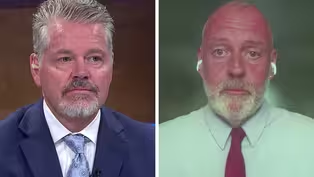Here and Now
Veterans Hope Wisconsin Will Restore Homeless Program Funds
Clip: Season 2400 Episode 2404 | 7m 24sVideo has Closed Captions
Legislation would restore funds to transitional housing facilities for homeless veterans.
A lack of funds in Wisconsin's 2025-27 state budget is causing two out of three transitional housing facilities that help homeless veterans to close, but proposed legislation would restore support.
Problems playing video? | Closed Captioning Feedback
Problems playing video? | Closed Captioning Feedback
Here and Now is a local public television program presented by PBS Wisconsin
Here and Now
Veterans Hope Wisconsin Will Restore Homeless Program Funds
Clip: Season 2400 Episode 2404 | 7m 24sVideo has Closed Captions
A lack of funds in Wisconsin's 2025-27 state budget is causing two out of three transitional housing facilities that help homeless veterans to close, but proposed legislation would restore support.
Problems playing video? | Closed Captioning Feedback
How to Watch Here and Now
Here and Now is available to stream on pbs.org and the free PBS App, available on iPhone, Apple TV, Android TV, Android smartphones, Amazon Fire TV, Amazon Fire Tablet, Roku, Samsung Smart TV, and Vizio.
Providing Support for PBS.org
Learn Moreabout PBS online sponsorship>> First tonight, more than 350 military veterans are homeless in Wisconsin.
According to the latest estimates, some are getting a fresh start through the Veterans Housing and Recovery Program, which offers job training and support for addiction.
But the program is now at risk after falling short of the funding it needed in the new state budget.
That's a concern for the veterans who rely on these services today, and for those who will need them in the future.
But as "Here& Now", reporter Steven Potter tells us, there are hopes new bipartisan legislation could restore funding and keep the program running.
>> It's like I developed all these bad habits with my anger and drinking, and I ended up in a shelter again.
>> Michael Cable is a veteran of the United States Navy.
He's also been homeless many times first as a child, then as a young adult.
And then he became homeless again after leaving the Navy in 2010.
>> Came back.
I was a full blown alcoholic and anger.
Just couldn't deal with my emotions at all.
>> Struggling to deal with life after the military.
>> You come back and it's like your life's gone.
Everything's changed.
>> He knew something drastic needed to happen.
And it did.
>> Once I got sober, I felt so much different about everything.
I used to dream about everything all the time.
And now I was actually doing things, working towards those dreams.
>> What changed is that Michael was accepted into the state's veterans Housing and Recovery Program at the Chippewa Falls location, known as Klein Hall.
Graduating from that program in May, he got hired at a local plastics factory.
And then all of his hard work paid off.
As this formerly homeless veteran became a homeowner.
>> I literally bought the first house I seen.
I gave him a full price offer and moved in, and I.
Every day I'm just standing there like, I can't believe it.
It's amazing.
>> Since opening in 2007, Klein Hall has helped roughly 1000 of Wisconsin's homeless and at risk military veterans find their footing and eventually secure permanent housing.
And while Michael is one of the success stories, he could also be one of the last veterans to use the Transitional housing and Recovery program due to a lack of funding in the new state budget.
Klein Hall in Chippewa Falls and another similar location in green Bay are slated to close their doors at the end of September.
>> We were really saddened and disappointed with the budgetary decisions.
It's a horrible situation.
>> The Veterans Housing and Recovery Program is run by the Wisconsin Department of Veterans Affairs.
Out of three locations.
Assistant Deputy Director Joey Hoey says they now only have enough money to keep one site open.
>> So we made some very difficult and agonizing decisions.
We've decided that we're going to focus our efforts on one of the three sites.
It's in Union Grove down by Milwaukee.
>> Politically, Democratic Governor Tony Evers has blasted Republicans in control of the state budget writing committee.
In a statement, Evers said, quote, there will now be fewer options for homeless veterans as a result of the legislature's irresponsible decision to reject the investments that I proposed.
Joint Finance Committee Chairman Senator Howard Marklein and Representative Mark Born responded by saying the governor failed to make this program a funding priority during budget negotiations.
And they added that the governor was, quote, looking for a scapegoat to blame for his administration's failure to adequately manage the changes to the program volume and demands.
>> Who cares?
Who cares whose fault it is?
That doesn't help the problem.
>> For veterans like Derek Aune, who first heard about it in prison.
This program is not only transitional, but it can also be transformative.
>> I'm learning all the time about this mental health stuff is I do not do regular life well, but I know that if I want to stay out of prison, then I have to be willing to do stuff like this because it's the best way for me to keep myself like in the right frame of mind.
>> Discharged from the Marines 20 years ago.
Derrick has been homeless several times over the years at Klein Hall.
He says he's found stability and he's been allowed to keep his emotional support animal, a friendly, attentive, husky mix named Phoenix, with him.
He appreciates that the program here is built specifically and only for veterans.
>> That makes a big difference.
And you'll hear that from almost every veteran across the board.
With any situation, whether it's treatment or groups or whatever.
There it is a different feeling when you're amongst other veterans.
>> Randy Withrow is the Klein Hall site director for Lutheran Social Services, which contracts with government veterans affairs agencies to manage the program.
>> Nobody's homeless because they don't have shelter.
It is a myriad of things that occur in their lives, whether it be legal, mental health, substance abuse, financial that leads them to homelessness.
And part of our job is to make sure that we shore up those areas so that then when they become either renters or owners, that they have the skills and the ability to handle that day to day living that you and I may take for granted.
>> Veterans stay in the program for a maximum of two years and participate in employment and education training.
They receive meals and transportation assistance and are also required to maintain absolute sobriety.
Program staff members are working to place veterans currently in the program in other housing initiatives, or to move them to the Union Grove location that's staying open.
But there is concern that if too much changes, some veterans will end up back on the streets.
>> Change is not something that they necessarily experience well, and now they've got to go and meet a new group and interact and integrate into something that's different.
>> Veterans affairs officials say there is still hope that the two housing program locations, scheduled to close in September, could be saved if new funding is secured soon and there is legislation being circulated at the state Capitol to do just that.
>> If we were to get funding, we could quickly restart the program.
>> With two of the three locations closing.
The overall program will shrink considerably from more than 100 beds total to just 40 beds at the Union Grove location, veterans say keeping the program running is a necessity.
>> These kind of things are pivotal.
If you don't want to have people rolling back through the system over and over and over again.
>> Just having a place where you can catch your breath and really get back your sanity doesn't take much.
Just a place to stay.
Some food and a counselor.
Someone cares.
Someone you talk to, life changing.
These guys are grateful for every bit of it.
>> Reporting from Chippewa
Here & Now opening for August 1, 2025
Video has Closed Captions
Clip: S2400 Ep2404 | 1m 2s | The introduction to the August 1, 2025 episode of Here & Now. (1m 2s)
How Copay Accumulators Affect Patient Access to Medications
Video has Closed Captions
Clip: S2400 Ep2404 | 8m 24s | Many patients are encountering an accounting tool that redirects savings from copay cards. (8m 24s)
Leftover 2024 Milwaukee RNC Money to be Donated to Charities
Video has Closed Captions
Clip: S2400 Ep2404 | 31s | The MKE 2024 Host Committee announced that over $5 million was donated to local charities. (31s)
McCoshen & Ross on Wisconsin's 2026 Governor's Race Forecast
Video has Closed Captions
Clip: S2400 Ep2404 | 8m 42s | Bill McCoshen and Scot Ross on the outlook for the 2026 race for governor of Wisconsin. (8m 42s)
Providing Support for PBS.org
Learn Moreabout PBS online sponsorship
- News and Public Affairs

Top journalists deliver compelling original analysis of the hour's headlines.

- News and Public Affairs

FRONTLINE is investigative journalism that questions, explains and changes our world.












Support for PBS provided by:
Here and Now is a local public television program presented by PBS Wisconsin



